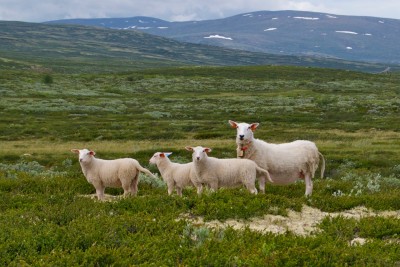At the height of Norway’s traditional open grazing season, one sheep rancher in Hedmark has emerged as a fan of fences to protect his flock from predators. Fencing in grazing land may not seem like a novel or brave move, but it’s fairly radical by Norwegian standards and not particularly popular with his fellow ranchers.

Rancher Reidar Hansen told newspaper Aftenposten recently that he’s simply learned that fences will keep wolves and other predators away from his sheep, pigs and goats. He hasn’t lost a single animal since he set up 14 kilometers of fences around 400 mål (about 100 acres) of land outside of Rena in Osdalen.
That should come as no surprise, but Hansen’s fence project has both defied the threat posed by a growing wolf population in his area of eastern Norway and challenged the tradition of open, free grazing.
Most ranchers in Norway insist on being allowed to release their flocks into the wild during the summer months, so they can fatten up on natural grass and foliage found at higher elevations. They contend the open grazing is better for the animals and can provide better meat.

The traditional open grazing, though, subjects their flocks to the risks of being mauled to death by predators. Instead of fencing in their animals, most ranchers want to shoot the wolves, bears or other predators, and that in turn has led to bitter conflicts between the ranchers and, on the other side, state wildlife authorities and environmental advocates. Wolves became nearly extinct in Norway, and the conservation officials want to see them returned to the wild.
A rancher who resorts to fencing in land may seem, to his fellow ranchers, like he’s giving up his open grazing rights and caving in to the conservationists. Hansen admits to meeting resistance to his fencing project, and both he and his wife withdrew from the local sheep- and goat-owners’ association. “We felt that our form of operations didn’t fit in there,” Randi Hansen told Aftenposten.
Hansen has received some financial support for his fencing project from both the state and an environmental fund, and State Secretary Heidi Sørensen of the environmental protection ministry came to visit earlier this summer. She’s from the Socialist Left party, which is keen to protect the wolf population and thus at odds with the party’s government coalition partner, the Center Party. Its constituency hails mostly from the farmers and ranchers who don’t share either Hansen’s or Sørensen’s views.
“This (protection for predators) is one of the most demanding debates we have internally (within the government coalition),” Sørensen admitted. “I think it’s important to demystify the wolf, and that the debate be as professional as possible.”
She’s enthusiastic about Hansen’s fencing project, and clearly wishes more ranchers would opt for fencing as well.
The Hansens concede that open grazing in their area is history, because of a growing wolf population, and that they’re simply adapting to a new reality. “Predators are here to stay,” noted Randi Hansen. “We have to adjust accordingly.”
Views and News from Norway/Nina Berglund
Join our Forum if you’d like to comment on this story.

